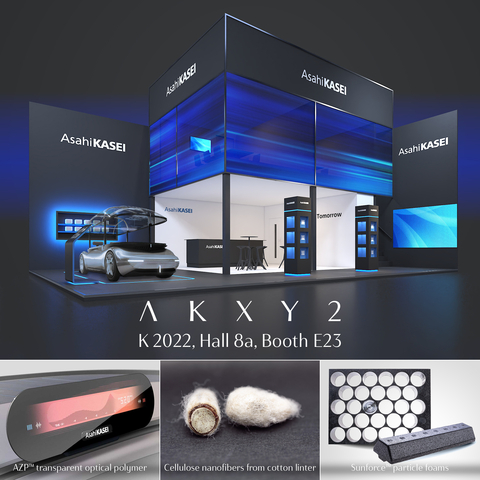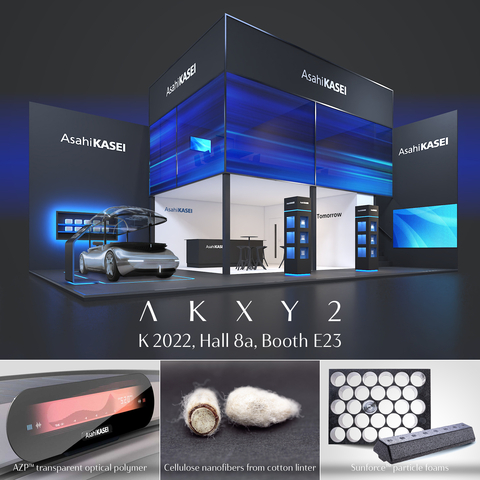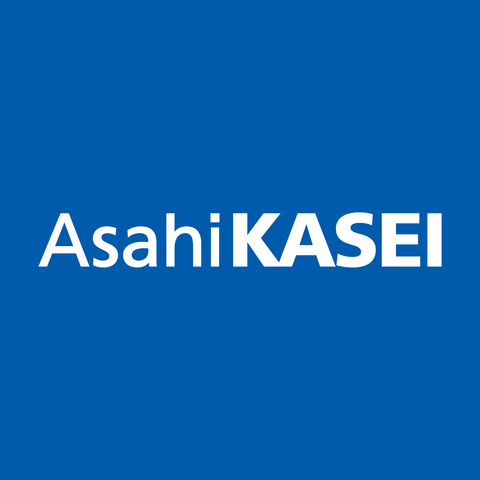NEW YORK & DÜSSELDORF, Germany--(BUSINESS WIRE)--Asahi Kasei, a diversified Japanese multinational company, will present its newest concept car AKXY2 for the first time in Europe at K 2022 from October 19-26 in Düsseldorf, Germany (Hall 8a, Booth E23). Utilizing a broad variety of materials and technologies, the vehicle showcases the company’s cross-divisional expertise throughout the entire value chain. Other highlights at this year’s booth will be innovative particle foams, bio-based filler materials and sustainable engineering plastics.
AKXY2 made its debut on May 25, 2022 in line with Asahi Kasei’s 100th anniversary. It demonstrates how the company applies expertise across throughout the entire value chain, from raw materials and production technologies to the usage of recycled and recyclable materials. Virtually everything that can been seen, touched or felt in the vehicle is either manufactured or co-developed by Asahi Kasei. The car features technology that touches the senses, improves safety and ensures the highest functionality while proposing solutions to reduce the environmental impact of automobiles.
All windows are made of outsourced hard-coated polycarbonate through a manufacturing method developed by Asahi Kasei in 2002 that uses CO2 as a raw material for its production. Today, 15% of the global polycarbonate production uses this production technology. To enable polycarbonate for applications in automotive windshields, Asahi Kasei is currently developing a hard-coating technology that equips polycarbonate with a UN ECE R43*1 compliant resistance to abrasion and weatherability. Replacing glass with this polycarbonate will significantly reduce vehicle weight and extend EV driving range.
The interior surfaces are covered by Dinamica®, a premium microfiber resembling suede partially made of recycled polyester - manufactured by Miko, an Italian subsidiary of Asahi Kasei Group company Sage Automotive Interiors. Sage Automotive Interiors can also provide other more sustainable fabrics utilizing raw materials that range from recycled PET, bio-based PET, natural blends, and ocean waste. An improved lifetime of materials is another way to achieve a greener mobility. All fabrics can be made anti-viral and anti-bacterial, as well as fluid-repellent and stain-resistant.
AZP™, a transparent optical polymer on the interior display features an ultra-low birefringence*2 and ensures a perfect screen visibility without rainbow effects. The interior is also featuring light technology, using semi-transparent and backlit fabrics made of PET, but also ultra-thin plastic-optical fibers woven into different surfaces.
Innovative Particle Foams for Battery Cell Holders and Structural Applications
Asahi Kasei will also present its SunForce™ family of innovative particle foams. Based on engineering plastics, all types are processable on standard foam molding equipment and open up new application fields for foams.
SunForce™ BE is based on modified polyphenylene ether (mPPE) and features an unmatched combination of lightweight, UL94 V-0 flame retardance, thin-wall moldability, thermal insulation and processability. At K 2022, Asahi Kasei will display 4680 and 2170 round cell holders made of this material. In this application the material allows for the precise fixation and alignment of round cells without the use of any adhesives. The material is also suitable for battery pack applications for any other kind of cell design like pouch-cells and prismatic cells.
SunForce™ AS is based on polyamide and features the typical properties of this engineering polymer. Its high stiffness and strength make it an ideal material for metal replacement in structural automotive components. This type also has the highest chemical and heat resistant properties in the product family.
Cellulose-Based Materials and Next-Generation Engineering Plastics
Asahi Kasei’s expertise in the field of cellulose goes back 90 years to when it first started sales of Cupro fiber with the trade name “Bemberg.” The company is now adapting this know-how to other application fields and developing a cellulose-based nanofiber filler material (CNF). Featuring a substantially higher purity than conventional wood-based cellulose, CNF is derived from cotton-linter, a byproduct of cotton yield. As an alternative to glass fiber, CNF can be used in engineering plastics like polyamide 6, polyamide 66 and polyacetal with a ratio of up to 20wt%.
As a leading Japanese manufacturer of high-performance engineering plastics, Asahi Kasei will also display its LEONA™ SG grades - a family of semi-aromatic polyamides featuring excellent mechanical strength, processability and surface quality – as well as the modified polyphenylene ether XYRON™ for 5G applications. The company will also present the background about its renewable attributed polyacetal and polyphenylene ether at K 2022.
Asahi Kasei will exhibit in Hall 8a, Booth E23.
Find more information on this year’s presentation on the dedicated landing page:
https://k-2022.asahi-kasei.eu/
*1 UN ECE R43 stipulates regulations around uniform provisions concerning the approval of safety glazing materials and their installation on vehicles by the United Nations.
*2 Birefringence refers to the double refraction of light that distorts projected images and becomes more noticeable when plastic bends. Plastics with low birefringence yield less distortion of the projected images, making them particularly attractive for heads up displays on windshields and dashboard navigation systems.
About Asahi Kasei
The Asahi Kasei Group contributes to life and living for people around the world. Since its foundation in 1922 with ammonia and cellulose fiber businesses, Asahi Kasei has consistently grown through the proactive transformation of its business portfolio to meet the evolving needs of every age. With more than 46,000 employees around the world, the company contributes to a sustainable society by providing solutions to the world's challenges through its three business sectors of Material, Homes, and Health Care. Its Materials sector, comprised of Environmental Solutions, Mobility & Industrial, and Life Innovation, includes a wide array of products from battery separators and biodegradable textiles to engineering plastics and sound solutions. For more information, visit www.asahi-kasei.com.
Asahi Kasei is also dedicated to sustainability initiatives and is contributing to reaching a carbon neutral society by 2050. To learn more, visit https://www.asahi-kasei.com/sustainability/.




